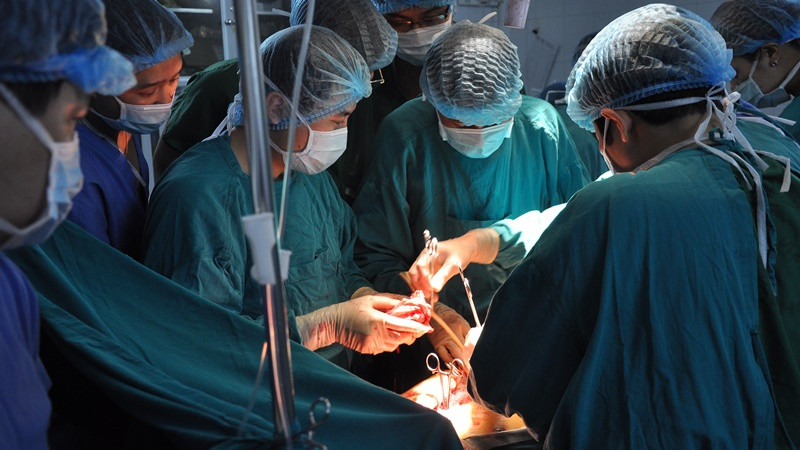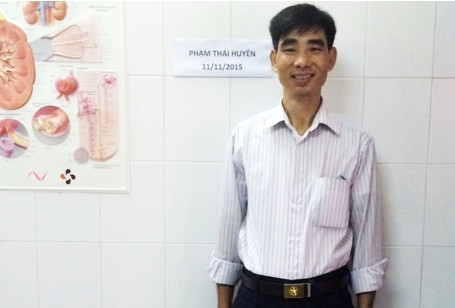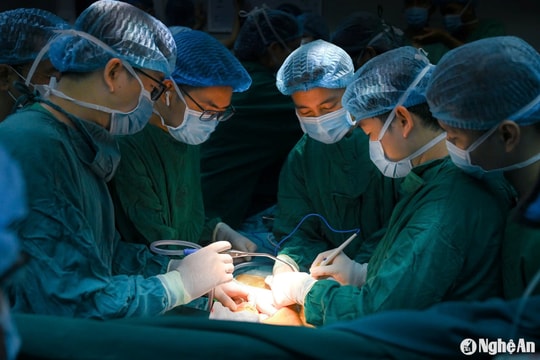3,600 sleepless hours of the first multi-organ transplant doctor in Vietnam
It has been more than two years since the first successful multi-organ transplant in Vietnam, but the tension still seems intact in the story of Major General Hoang Manh An, Director of Military Hospital 103, the main doctor who performed the historic transplant.
Historic transplant
On March 3, 2014, Hospital 103 announced that it had performed the first multi-organ transplant (pancreas and kidney) in Vietnam. This is considered a historic development, bringing Vietnam's organ transplant industry closer to the world's organ transplant level. Dr. Hoang Manh An and 150 staff from the Military Medical Academy and Hospital 103 participated in this transplant.
 |
| Doctors at Hospital 103 in the first multi-organ transplant in Vietnam. |
Dr. An said that, for a long time, Vietnam has only been able to perform single organ transplants, never multiple organ transplants. "The KC10 project raised this issue and our 103 Hospital has received multiple organ transplants of pancreas and kidney," Dr. An said.
To prepare for the first multi-organ transplant, doctors at Hospital 103 were selected to be sent to major centers in the world to study and collect documents. To practice the technique, Hospital 103 operated on more than 40 pairs of pigs, taking the pancreas and kidney from one pig and transplanting them to another.
However, the difficulty in performing organ transplants is finding donors. Dr. An said that due to cultural factors, organ donation in Vietnam is facing many difficulties.
Dr. An said that at that time, the hospital was fortunate to be able to persuade a person who had been in a traffic accident to donate organs. The doctors reviewed the list of patients waiting for organ transplants at Hospital 103 and found Mr. Phan Thai Huyen, a patient with diabetes and kidney failure, a soldier in Son La province, with suitable indicators. Contacting Mr. Huyen to inform him about the organ transplant was quickly carried out.
However, the announcement was made at around 1pm, but at around 2pm, Mr. Huyen called back to inform that there were no buses running the Son La - Hanoi route at that time. And if he wanted to go to Hanoi, he would have to take the evening bus, and at the earliest he could be at the hospital by 5am the next morning.
"Since the donor is brain dead, the organ can only be maintained for 12-18 hours to perform the transplant. If the patient could only go to the hospital the next morning, it would be too late," Dr. An recalled. To ensure time, Dr. An had to call the Son La provincial military commander to arrange a private car to take Mr. Huyen to Hanoi that same night.
 |
| Major General, Doctor Hoang Manh An, Director of Hospital 103, who directly performed the first multi-organ transplant. |
"We only had time to do the most basic tests, not everything else. At 3am that morning, we decided to perform the transplant," Dr. Anh recalled. The transplant lasted 13 hours, from 3am on February 28 to 4pm on March 1. Two days later, on the morning of March 3, Mr. Huyen woke up.
"By the time the patient wakes up, the transplant can be said to be a technical success," said Dr. An.
5 months of insomnia
The patient has regained consciousness. Hospital 103 also held a press conference to announce the completion of the historic organ transplant. However, the post-transplant monitoring process is the time that makes Dr. An "lose sleep and appetite".
Dr. Hoang Manh An recalled that around the 5th day after the transplant, complications began to appear. "A lot of fluid began to flow out of the incision. By the 2nd week, there was a phenomenon of multiple pleural effusion. The pleura, pericardium, and abdomen were always full of fluid, and liters had to be aspirated."
Dr. An and his colleagues diagnosed that the newly transplanted pancreas was inflamed and that the old pancreas in the abdomen was also inflamed, leading to such a large effusion. "On the one hand, we actively treated it, on the other hand, we called centers in the US and Japan to ask for experience in handling this problem," Dr. An said.
After that, the patient's condition improved, but by the fourth month, fluid was flowing out from the surgical wound like a stream. At first, Dr. An feared that the connection between the pancreas and the duodenum and bladder was leaking.
"If the pancreas graft's anastomoses leak like that, it will be very dangerous. Besides, inflammation of the pancreas can easily cause the patient to die from poisoning," Dr. Anh shared.
Dr. An said that at that time he was worried not only because the transplant could fail, but also because if the first transplant was not successful, it would be a long time before he would dare to do another transplant.
That's why the 5 months of monitoring and treating patient Huyen were a time when Dr. An and his colleagues at Hospital 103 lost sleep and appetite. They had to take turns staying at the hospital 24/7 to monitor every change in the patient. "During those 5 months, I rarely went home," Dr. An shared.
"By the fifth month, we had made a small opening in the abdomen to suture the end of the duodenum and the patient had completely recovered. What made him extremely happy was that he no longer had to take medication for diabetes or kidney failure, and only used immunosuppressants according to the general procedure for organ transplant recipients," said Dr. An.
 |
| Mr. Phan Thai Huyen, 21 months after the multi-organ transplant, is in stable health. Photo: Hospital 103. |
Recalling the 5 months of treatment at the hospital after the transplant, Mr. Huyen said that at that time he did not know about the complications after his surgery, but he clearly remembered the doctors who took good care of him during that time.
Mr. Huyen also confirmed that after 2 years of the transplant, his illness was cured and he is now living a healthy and stable life like a normal person. He is no longer tormented by the hypoglycemic episodes that once almost took his life. And more importantly, he no longer has to eat and drink in a restricted manner like before.
Currently, Dr. An and Hospital 103 are preparing for the second multi-organ transplant. Dr. An said that after the success of the first transplant, the next transplant will be more convenient and the cost will be much cheaper.
According to vietnamnet
| RELATED NEWS |
|---|


